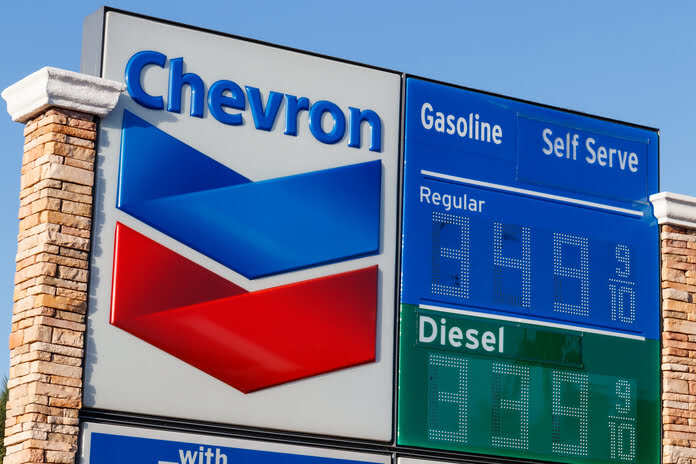Chevron Stock (NYSE:CVX)
Chevron Corporation (NYSE:CVX), one of the world’s largest integrated energy companies, has recently made headlines with its announcement to acquire PDC Energy, a leading independent exploration and production company. This strategic move has sparked curiosity and debate within the energy industry. In this article, we will delve into the details of Chevron’s deal to buy PDC Energy and explore whether it truly represents a bargain.
Chevron’s acquisition of a smaller oil and gas producer PDC Energy Inc (NASDAQ:PDCE) Concerns are being raised about Energy because of what some people consider its unusually low acquisition cost.
“Some have described this as a take-under,” I’ve heard. Technically incorrect, but conveys the meaning, says Pickering Energy Partners’ chief investment officer Dan Pickering in an email to Barron’s. The winner in this case is Chevron.
Deals, where the acquirer pays less than market value, are known as take-orders.
PDCE AND CVX Stocks
PDC Energy, a leading Colorado oil and gas producer, will be acquired by Chevron (NYSE:CVX) for $6.3 billion, or $72 per share. Chevron notes that this price is 14% higher than PDC’s average share price over the prior 10 trading days.
PDC was trading at $69.82 on Monday, indicating that investors believe the deal will likely close but not without a chance. The apparent discount to the deal price could also be explained by the fact that Chevron acquired PDC using its own stock, meaning that PDC’s stock would also be affected by changes in the price of Chevron stock. On Monday, shares of Chevron dropped 1.8%.
For Chevron, which would take over as Colorado’s top producer, it seems like a good deal. Shareholders of PDC are reacting less favorably to the deal. Many analysts have a price target of $90.29, which is about 25% below the current price, and some are debating whether Chevron should be paying more.
The acquisition has been approved by the boards of both companies, but PDC shareholders still have the final say.
It can be difficult to determine whether an acquisition is a relative value because there are many different ways to value an oil and gas deal.
According to Truist analyst Neal Dingmann, the deal values PDC at 2.9 times its anticipated enterprise value to Ebitda (earnings before interest, taxes, depreciation, and amortization) over the following four quarters. He calculates that’s comparable to two other deals done this year.
On some other metrics, however, such as the price per flowing barrel of oil—which measures the deal value based on how much oil the company currently produces—it is less expensive than other recent deals, according to Dingmann.
Others questioned the cost as well.
Without speculating as to whether the transaction will go through or not, PDC shareholders may want to ponder why now and why to sell at a price equal to two times the projected Ebitda for 2024. said Nitin Kumar, an analyst with Mizuho Group.
The companies held a conference call with analysts following the deal’s announcement on Monday. According to PDC CEO Barton Brookman, the business was able to “maximize value” for its investors.
Analysts disagreed as to whether a competitive bidding process existed, which could have increased the price.
“What is surprising to us is we do not believe the deal was fully shopped across the industry which could have potentially enabled an even higher bid for PDCE,” wrote Dingmann in a note prior to the conference call.
Dingmann questioned Brookman on the call about any additional offers PDC had received. “I can’t give you many details, but I can assure you that the Board underwent a rigorous process as we considered the merits of this deal and other options, and it was unanimously decided that this is the best deal for our shareholders,” Brookman said. So, the procedure was exhaustive. I’ll make that promise.
Analysts have noted that PDC has recently traded at a higher price than the purchase price. $89.22 is its 52-week high.
According to Tim Rezvan, a KeyBanc analyst, PDC shares “traded above $80 at various points in 2022,” according to Barron’s interview. A little earlier this year, they were over $70. So, to us, the pricing doesn’t seem all that strong.
PDC also recently acquired enough permits in Colorado, a state where permitting reviews can be challenging, to last for about five years. In addition, the company has a strong balance sheet and free cash flow. Rezvan declared that the company “was not in any kind of financial or strategic distress.”
Rezvan nevertheless believes that the deal will be approved by the shareholders. Given the difficulty of obtaining permits in Colorado, among other issues, he said, oil producers there have a tendency to trade at more affordable valuations than producers in Texas. The alternative for PDC would be to continue to be independent since it doesn’t seem that there were any other bidders for the company. The share price would likely return to $65, where it was trading prior to the announcement, in the near future if the deal fell through, he added.
Vanguard, BlackRock BLK -1.47%, and Fidelity are PDC’s largest shareholders. These companies frequently hold sizable passive stakes in businesses thanks to the ownership of index funds and other ETFs by their investors. Wellington Management and Dimensional Fund Advisors are the next two biggest stockholders. In response to a question about whether Dimensional supports the agreement, a spokesman stated that “as a systematic investment manager, we do not comment on individual stocks.” An inquiry for comment from Wellington received no response.
There may be another issue that delays the transaction. Recently, the Federal Trade Commission has raised antitrust concerns regarding certain oil and gas transactions. According to analysts, this agreement would leave three companies in control of the vast majority of Colorado’s acreage.
On the conference call, when questioned about the matter, Chevron CEO Mike Wirth responded, “We don’t see any competition issues being involved.”
Other significant players in the energy sector will undoubtedly pay attention to the agreement between Chevron and PDC Energy. Competitors might carefully examine the strategic ramifications and look into their own expansion and consolidation opportunities. The merger and acquisition activity within the industry may increase as a result of the acquisition, which has the potential to alter the competitive landscape.
Featured Image: Megapixl















